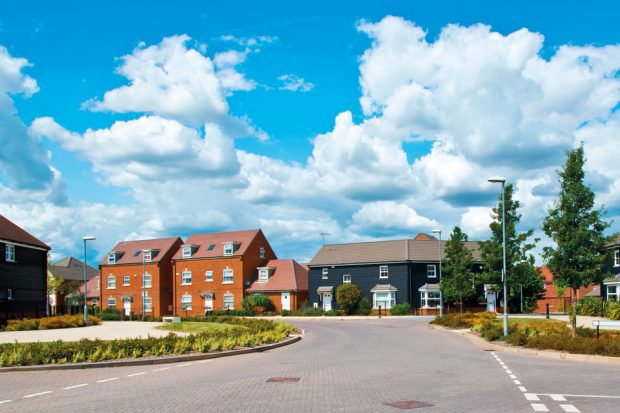
Chief Executive and Chief Land Registrar Graham Farrant explains how our new Business Strategy sets our direction for the next five years
HM Land Registry was set up in 1862 to make conveyancing simpler, faster and cheaper, by moving from an unregistered system of ownership to full registration of land. Our mission today, ‘your land and property rights: guaranteed and protected’, reflects this heritage and reinforces our commitment to put our customers right at the heart of our organisation.
We have just released our Business Strategy 2017 to 2022, setting the direction we will take over the next five years to meet the ambition set for us by the Government ‘to become the world’s leading land registry for speed, simplicity and an open approach to data’.
Our Business Strategy sets out how we will become brilliant at the basics: our core statutory registration services. We will make dealing with us quick and simple by becoming even more customer focused, digital and efficient while upholding our values.

We want all the land and property in England and Wales to be registered. Creating a more definitive record of property ownership in England and Wales, with high quality and comprehensive data, will help us make buying and selling houses simpler, faster and cheaper and will support economic and housing growth.
By 2022 we aim to digitise and automate 95% of our daily transactions to help simplify, speed up and improve the efficiency of registration.
We are exploring ways of improving conveyancing, by helping to improve the way that Local Land Charges are managed, working with stakeholders in the property market to set up industry and policy forums and looking at issues with leasehold registration.

Our Digital, Data and Technology team continues to explore in the lab how land registration might work in the future, through our ‘Digital Street’ project. They are creating a pilot digital register for a small selection of properties, which is fully machine readable and able to be updated instantly. By using cutting edge technology and by making the information that matters the most to citizens and firms more available, the team is conceptualising how people could buy, rent, sell, finance, build and manage property with ease.
An open approach to data is one of the three main strands of our ambition. The UK has some of the best geospatial data in the world, with much of it held by public bodies like ourselves. We will publish a wide variety of data available in high quality and accessible formats, supporting the growing digital economy, enriching the nation’s geospatial intelligence and working with the developing Geospatial Commission.
To modernise and reshape the organisation, we need to empower our people – our most precious asset. We will continue to develop the skills of our caseworkers to enable them to become the most digitally skilled land registration experts, blending their registration expertise with digital systems.

We have a robust financial plan to ensure that our aims are affordable, deliver value for money and can respond to fluctuations in the market.
We know we can’t do all of this alone. We recognise the critical role our partners will play in making it a success, which will enable us to be the world’s leading land registry for speed, simplicity and an open approach to data.
We are proud of our heritage and history and through our transformation plans we will extend our cherished reputation even further for the benefit of our people, our customers and the nation. I hope that you, our partners, view this as an exciting opportunity and will join us on this journey.
12 comments
Comment by Miles Dearden posted on
All very fascinating. However one is inclined to suggest you should start with the basics: process the back log and complete all applications in less than three months.
As a practitioner that regularly deals in complex land transactions it is deeply frustrating that the Land Registry now advise that they will not look at the majority of such applications for between 9 and 12 weeks. This has direct and indirect costs for us and our clients.
Its not however all bad news. Having dealt with land in Northern Ireland and Scotland, England and Wales undoubtedly have the clearest system of land registration in the UK.
Comment by Ian Flowers posted on
Thank you for your comment.
I completely agree with you that we must aim to be “Brilliant at the Basics” which is why that is the first of our six major themes in our new Business Strategy (see page 8).
Therefore, our focus for this year has been about bringing down our backlog, ensuring we are meeting our speed of service targets and delivering against our quality standards. We published this [online](https://www.gov.uk/government/organisations/land-registry/about-our-services)
We received just under 5 million applications to update or create a register in the past 12 months. We are still maintaining our service standards for quality, ensuring that we get things right first time in nearly all cases and we are continuing to process the vast majority of the applications we receive quickly.
We currently complete 94% of registration applications within three months of receiving them. However, we are taking longer to complete registration services applications involving the creation of a new register (such as new leases and first registrations) which require more work and involve more stages and we are completing 49% of these within three months of receiving them. We know that in some cases this may be causing problems. The current average completion times for new title applications are:
• first registrations: 62 working days;
• new leases: 66 working days; and
• transfers of part: 69 working days.
We have taken several steps to address this including:
• recruiting more than 1,000 new staff since January 2016 and making overtime available across our offices;
• introducing a new digital tool for customers called Application Enquiry which allows you to view the progress of any specific application online, freeing up our caseworkers time to focus on applications;
• rolling out centralised customer-handling teams that deal with incoming calls and email to increase caseworker productivity; and
• visiting customers to get their feedback on what we can do to help – there are clearly things we can do to help improve the level of service we provide including ensuring greater consistency.
However, our plans also need to look to the future. Which is why we are working towards our long-term aim to achieve comprehensive registration by 2030, to digitise our services and maximise the accessibility and re-use of our data.
Over the next few months we are expecting to see real progress on processing applications more quickly. In the meantime you can check the progress of your applications with [Application Enquiry]( https://www.gov.uk/guidance/land-registry-portal-make-an-application-enquiry). If an application becomes urgent, or is holding up a following transaction, you can make a request to expedite it from within Application Enquiry.
Thanks for recognising the clarity in our registration process, our Business Strategy’s main aim is to ensure that are continuing to make conveyancing simpler, faster and cheaper for all.
Comment by dennis parker posted on
Then can you make it easier for the general public to complete forms, I also asked a few days ago what I needed to do to put a charge on a property as there is money owed to me, I still have not had a reply to my mail
Comment by Jim Kendall posted on
If you were to make a phone number available and not leave customers in mail unread and un-directed to the correct person, would be a great improvement
Comment by ianflowers posted on
Thank you for your feedback which we will take on board.
We have recently made some changes to our ‘Contact us’ page - https://www.gov.uk/guidance/contact-hm-land-registry to make it easier for customers to find all the information they need.
As you may be aware, we operate a centralised system for the handling of incoming telephone calls. The central team is a virtual one involving a large pool of staff working from different offices. The centralised system allows us to provide a better and more consistent service to our customers. When necessary, an enquiry can be referred to a specific member of staff who may be dealing with an ongoing matter.
Similarly, we operate a centralised system for the handling of our incoming postal applications and correspondence that involves scanning them on receipt so that they can be distributed electronically as appropriate. We do have procedures in place to allow a customer to send a paper document direct to a specific member of staff when needed.
Given the scale and scope of our operation, some errors and delays will inevitably occur, but I do apologise if you did not receive an acceptable level of service from us. As set out in our Business Strategy we will create new customer services function bringing together our customer facing teams to provide consistently high quality multi-channel experience.
Comment by David Charlton posted on
I work in Local Government property. We have embraced land registration of all the Council's property and have been pleased we did this. It has many advantages.
Your long term ambition to see the whole country registered one day is great. In my District unregistered property seems to be mainly farm land and other estates and infrastructure such as railway lines and road networks. Can you say a bit more about how you will target these missing registrations and in particular how will your address the lack of resources that these property owners are likely to have to commit to the job. This seems to be a real barrier.
Comment by Maggie Telfer posted on
Thanks for your comment Andrew. I’m the Deputy Director for Register Completion here at HM Land Registry and it is great to have your support for our ambition to achieve comprehensive registration. I’m really pleased that you are experiencing the benefits of having registered the council landholdings, and we hope we can persuade others that there is a strong case for taking positive action and making land registration a ‘must do’ investment.
In 2018 our initial focus will be to work with Local Authorities, public sector bodies and stakeholder groups, to understand their challenges and find shared solutions to minimise the impact on resources. We will be looking to assess what practical assistance we can offer, and recognise that this will vary from authority to authority. In the longer term, we will be exploring the feasibility of introducing new legal triggers and registration ‘levers’ to drive registration of the remaining land. The impact on individuals/estates/business would be considered as part of the feasibility work. As part of the overall strategy, we will be aiming to register the strategic road and rail network by 2030, and have been piloting a streamlined registration process with Highways England.
Thanks for getting in touch.
Comment by David Charlton posted on
Thank you Maggie for your reply.
This sort of information would be very helpful to my public sector colleagues across Hertfordshire. We, that is local authorities, police and health, regularly meet to share property matters under the Government's One Public Estate. It may be useful at the appropriate time if a representive of the Land Registry could make contact or even present to this public sector group.
Regards
David Charlton
Comment by Greig Wishart posted on
The most frustrating thing about dealing with the Land Registry these days is that one can not assume one is dealing with an expert in matters of land registration. It is a shame you have not embraced the rich resource of experience and talent that was once represented by the scores of personnel you put through your fantastic training regimes. Complex land registration issues are simply beyond most of the people one deals with now at the Land Registry.
I wish you well with your ambitions but feel that you have handicapped yourselves in your rush to convert the Registry into a profit generating organisation at the expense of maintaining thorough and accurate service.
Greig Wishart
AGY Consultants Ltd, Digital Land Terrier and Data Maintenance Specialists.
Comment by ianflowers posted on
I am sorry to hear of the difficulties you have experienced. I note you have also sent these comments via our contact form and so we will consider and respond direct to the email you have provided.
Comment by simon kadwill-kelly posted on
The land registry has introduced an excellent fraud alert system by email.
Also putting on restrictions to titles that mean transfers get referred to the owners solicitor is another excellent method to reduce fraud.
With more speed involved with transactions being more computerised digitally are there plans to increase anti-fraud methods to deter and stop fraudulent applications
Comment by ianflowers posted on
Simon - thank you for your kind comments. You may be interested in one our of our other blogs - https://hmlandregistry.blog.gov.uk/2018/02/15/using-gov-uk-verify-for-the-first-digital-mortgage/ . This gives details of the first digital mortgage using GOV.UK Verify as a digital solution for identity verification. This project is still in its formative stages and other solutions may be introduced further down the road. As mentioned in that blog, this transitionary period is an opportunity to strengthen the integrity of the register and safeguard against fraud.